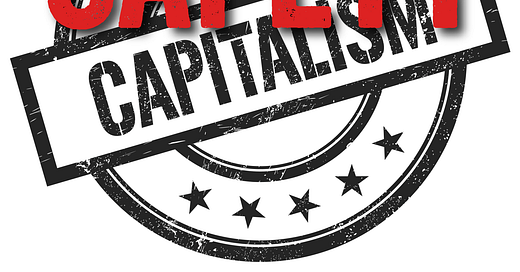Kylie and I are just starting to explore a data set collected for us by YouGov between October 16-26, 2023. Today, we dig into new data on the drivers and potential outcomes of safety capitalism. We point to confusion about the link between a robust economy and a robust standard of living. WARNING. If you are triggered by economic incongruencies take a deep breath before proceeding.
We asked Millennials and Gen Zs the following items:
It is more difficult for people like me to get ahead than it was for my parents. Difficult
People who live in countries with high levels of economic redistribution are happier. Redistribution
Taxes and redistribution should be used to make free markets safe for everyone. Safe Markets
Beyond meeting everyone’s basic needs, there is no point in trying to grow the economy. Degrowth
The first item is not supported by current macroeconomic data. Emily Dohrman and Bruce Fallick of the Federal Reserve Bank of Cleveland show real median household incomes have risen steadily since 1980. Also, Millennials are buying houses, and saving more in their 401K than their parents. On many fronts, they are surpassing the older generation in wealth when compared to them at the same stage in life.
The second statement linking redistribution and happiness evokes images of Nordic people forking over massive taxes to the government in return for cradle-to-grave welfare. Setting aside the fact that a Nordic-style social safety net would be difficult to democratically implement in the US, recent research on 52 nations shows the correlation between money and happiness is higher when both GDP per capita and income inequality are high. Income inequality may contribute to envy, but if a country is wealthy and growing, it does not diminish happiness. National wealth is important.
Safe free markets, an oxymoron
Sweden is a good example of a rare nation that was able to democratically reject socialism in the 1990s when high taxes and massive redistribution killed innovation and real wages. The Swedes got wise and liberalized. Argentina, the most recent disaster, will now try to do so.
We encourage businesspeople to get their heads around the implications of Chart 1. Over half of Millennials and Gen Zs think it is tougher for them than their parents, that economic distribution creates happiness, and redistribution can make free markets safe for everyone. Perhaps the most stunning data point is that 42% of Gen Zs and 29% of Millennials don’t understand the link between a growing economy and achieving what they care about like space travel, cheap energy, clean environments, or eliminating global poverty.
Here are additional data points that contextualize Chart 1 (the margin of error for this data set is +/-2.33%).
A strong positive correlation (+.462) between items 2 and 3 suggests people who think redistribution makes people happier also think markets can be made safe through taxes and redistribution.
Weak positive correlations between support for degrowth and feeling it’s difficult to get ahead (.2158), and between support for degrowth and thinking high levels of economic redistribution create happiness (.3093) suggest degrowth and high levels of economic redistribution are loosely linked in the minds of many.
At 59%, Whites are significantly more likely than Blacks (48%) and Hispanics (47%) to think “it’s more difficult for people like me to get ahead.” Hispanics are less supportive of making markets safe (49%) and achieving happiness through redistribution (47%) than Whites (58% and 59%, respectively) and Blacks (56% and 59%, respectively). Whites and Hispanics (about 36%) support degrowth less than Blacks (about 40%).
Education has no impact on outcomes. In fact, people with a four-year degree are slightly more likely than people with less than a four-year degree to support the idea that redistribution makes people happy (59 vs. 53%), that taxes and redistribution can make markets safe for everyone (60% vs. 55%), and that there is no point trying to grow the economy (38% vs 35%). A slight majority of both groups (about 54%) thought it was more difficult for them to get ahead than their parents.
Safety for all is prosperity for no one.
As we’ve stated in past posts, America is the wealthiest nation in the world and a dynamic free market should support a robust standard of living for all citizens. We’ve also described data showing that Millennials and Gen Z expect robust economic freedoms, including owning property, investing for profit, and having a lot of leeway in bargaining for compensation. As part of this survey, we asked Millennials and Gen Z what they thought one person needed to live in the United States, after taxes. Their response was far from unreasonable. The median was about $50,000. In 2022, real median household income was $74,580 and personal income was $40,480.
Why younger generations believe it is more difficult for them to get ahead is not clear. Over the last decades, healthcare, housing, and education prices—items key to providing a feeling of security and opportunity—have risen more than middle-class incomes. This may be one reason older Millennials, especially, feel it is more difficult for them to get ahead than it was for their parents. Massive stimulus during COVID-19 furthered a cultural illusion that our economy always operated with low interest rates and easy money. It is not surprising a post-COVID deficit headache and a bout of inflation further elevated discontent with the economic performance of elected officials. High taxes, cradle-to-grave welfare, and no-growth perspectives epitomize an economic safetyism that, if left untreated, could be on track to kill American happiness and prosperity.






